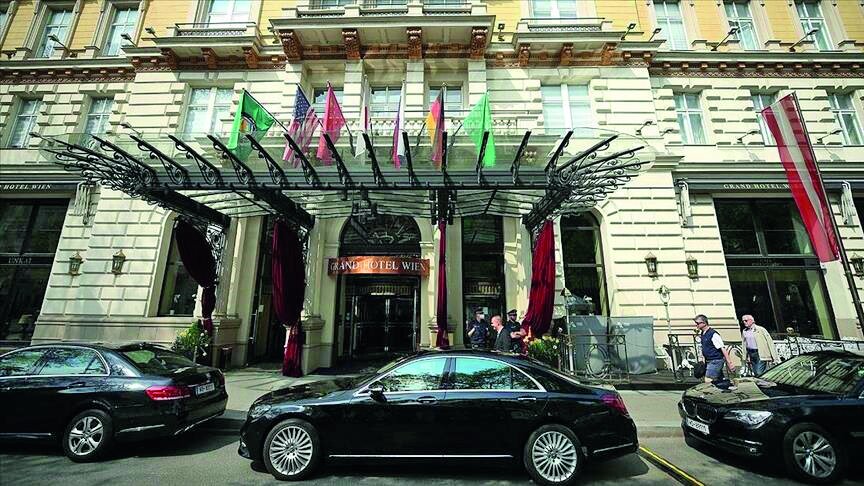Western blackmail will get nowhere

TEHRAN – While Iran makes preparations for achieving a “good agreement” through good faith, the United States and its European allies ramp up pressure in what seems to be diplomatic blackmail.
The recent visit by the United Nations’ nuclear watchdog chief to Iran appears to have provided Washington and other European capitals with diplomatic ammunitions to ratchet up their hostile rhetoric against Iran at a time when the heavily-sanctioned country struggles to show goodwill ahead of the Vienna talks that are due to be held on November 29.
During his visit to Tehran, Rafael Grossi, Director-General of the International Atomic Energy Agency (IAEA), met with Mohammad Eslami, the head of the Atomic Energy Organization of Iran (AEOI), and Iranian Foreign Minister Hossein Amir Abdollahian.
By his own account, Grossi said he held “very constructive” talks in Tehran, though the talks did not result in an agreement, as was the case with his last two visits to Iran.
But Grossi’s remarks didn’t convince Washington and its European allies to make room for further talks between Iran and the IAEA, though conversations between the two sides were underway even after Grossi left Tehran for Vienna.
Shortly after Grossi’s departure, the U.S., the E3 – France, Germany, and the UK-, and the European Union started to issue threatening statements against Tehran.
U.S. special envoy for Iran Rob Malley was among the first to use threatening rhetoric against Iran while the country was busy negotiating with Grossi.
“If they start getting too close, too close for comfort, then, of course, we will not be prepared to sit idly by,” Malley told National Public Radio. He then appeared to threaten Iran with non-diplomatic efforts.
“If they choose not to go back into the deal, then obviously we're going to have to see other efforts - diplomatic and otherwise - to try to address Iran's nuclear ambitions,” he added.
The remarks came on the heels of Malley’s trip to the Persian Gulf Arab states where he appeared to dangle a carrot of “opportunities for regional economic & diplomatic ties” between Iran and some oil-rich Arab states in the Persian Gulf. But the carrot was brushed aside by Iran. Iranian officials seem to have not taken the U.S. incentive seriously.
And now they did prove right given the U.S. rehash of hostile rhetoric and blackmail.
The E3 also jumped on the bandwagon. They delivered a joint statement to the IAEA addressing Iran’s implementation of its nuclear commitments under the 2015 nuclear deal, formally called the Joint Comprehensive Plan of Action (JCPOA).
In their statement, they took an alarmist approach toward Iran’s nuclear program, accusing it of pursuing nuclear weapons. “Research & Development (R&D) with both natural and enriched uranium metal lack any plausible civilian justification in Iran,” the E3 claimed.
The EU also had its own mild share of pressure on Iran. Following a phone conversation with Amir Abdollahian, EU Foreign Policy chief Josep Borrell underlined the need for cooperation with the IAEA.
“Spoke to @Amirabdolahian ahead of Vienna talks. More urgent than ever to bring #JCPOA back on track. We have a real possibility ahead, and need to swiftly conclude discussions on all open issues with pragmatism, realism and good faith. Full cooperation with @iaeaorg is key,” Borrell said on Twitter.
The West’s mounting pressure on Iran comes as Tehran is underlining that a “good” and “swift” agreement is possible. After more than five months, Iran agreed to return to Vienna, notwithstanding Western pressure.
The Americans and Europeans, however, seek to pocket more concessions from Iran despite their non-compliance with the JCPOA. And they want to do so by leveling magnified accusations against Iran. But they will most likely fail as Iran has proven time and again that it does not respond to pressure.
The spokesman for Iran’s Foreign Ministry, Saeed Khatibzadeh, has summed up the West’s approach to Vienna talks on Twitter, “Ahead of #ViennaTalks, US/E3: - Issue bogus statements - Add sanctions - Conjure distorted narratives - Keep mum on Israel's threats. Iran: - Forms high-level nego team - Calls for quick good deal & full implementation of JCPOA/2231 - Holds regional consultations.”
